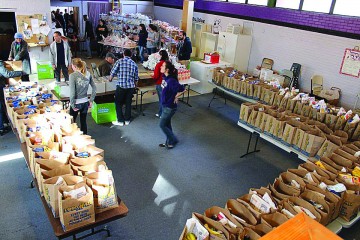
The fight against hunger exists even in one of the world’s richest agricultural areas, and students, faculty and staff at Fresno State are working together to help the needy in the Valley.
Jessica Medina from Advising Services, who has worked with the student-run Bulldog Pantry since it started in 2007, said it feels right to call it a fight to stop hunger. The effort requires volunteers and the community coming together.
“There’s a lot of people out there who are not only struggling to pay their bills, but are trying to decide, ‘Do I pay the bills this month or do I put food on the table for my children?’” Medina said. “We want to say we helped them fight that constant wonder in their mind of what they’re going to be able to do this month.”
In 2012, the UCLA Center for Health Policy Research reported that about 3.8 million people were “food-insecure” in California. Specifically, the San Joaquin Valley is one of the worst areas in the state in terms of this problem.
“The San Joaquin Valley is one of the most productive agricultural regions in the nation and yet we have a number of individuals in these communities who do not know where their next meal is coming from,” said, Karen Ross, Secretary for the California Department of Food and Agriculture, in a July 31 press release. “Bringing together the agricultural community with local food banks, faith-based organizations and other stakeholders is an important step in addressing food insecurity in the Valley.”
Allies in the struggle can be found throughout the Fresno State campus, Medina said. Clubs and other organizations put together food drives and volunteer their time to address the problem.
“Our biggest thing is we are trying to tap into the resources around us so that we can help to end the hunger around us,” Medina said. “There are so many places for us to get food. A lot of food goes untouched, uneaten and is thrown out every day. We want to get our hands on some of that. This is perfectly good food, and we want to be able to provide that to families.”
It bothers Dr. Robert Levine, a psychology professor at Fresno State who has chaired the board at Poverello House, that there are people in the agriculturally rich Valley who are hungry.
“Frustrating is an understatement,” Levine said. “At Poverello House, people can leave food that they’re not using so people can eat. The notion we have so much food”” we have so much excess””shouldn’t we be able to fix that? There’s unused food, and there are hungry people.”
Levine said he’s thankful there are food banks and organizations helping to bridge the hunger gap.
The Bulldog Pantry is one of the most prominent examples of students acting together to solve the problem.
“The students order the food, pick it up from the community food bank, pack it on Friday and distribute it on Saturday,” Medina said. “We have clubs and organizations that are constantly doing food drives for us on campus. Classrooms do work for us in different projects throughout the semester. Students are diving in there and want to help.”
The pantry will open its doors Saturday for the first time this semester, and Dr. Paul Oliaro, the vice president of student affairs, said he is proud of the students’ efforts, and that he and his wife will be at the opening.
“The pantry is the best example of sustained effort by students to help feed families,” Oliaro said. “They spend the week reaching out to organizations to get food. The university and students take it seriously.”
It’s an important experience for students, said Chris Fiorentino, director of the Jan and Bud Richter Center for Community Engagement and Service-Learning.
The university also works with the Community Food Bank, Fiorentino said. He said Fresno State students make up a significant percentage of the volunteers for the Wesley Methodist Church Thursday meal program called Base Camp as well.
“Food insecurity is a huge problem in our area,” Fiorentino said. “When students get involved with food pantries, they are addressing a need that is life-threatening.”
Many students who have volunteered at Poverello House, Levine said, are glad that they gave their time to help.
“Instead of thinking about how terrible the world is, they go down and do something,” Levine said. “That feels good. At Poverello House, you can literally serve people. It just feels right to do it. Once you get down there, you say a few hellos and have a chat with somebody, and you remember you’re dealing with human beings. You also confront the problems in your own backyard.”
Medina said students might think they know the face of hunger, but their stereotypes are busted when they volunteer at the Bulldog Pantry.
“You don’t know,” Medina said. “They make it look like they make plenty of money, but you don’t know what their life is like and what they’ve been through. The face of hunger definitely changes when you work with a group like the Bulldog Pantry. You get to work with people firsthand that come through and hear their stories.”




